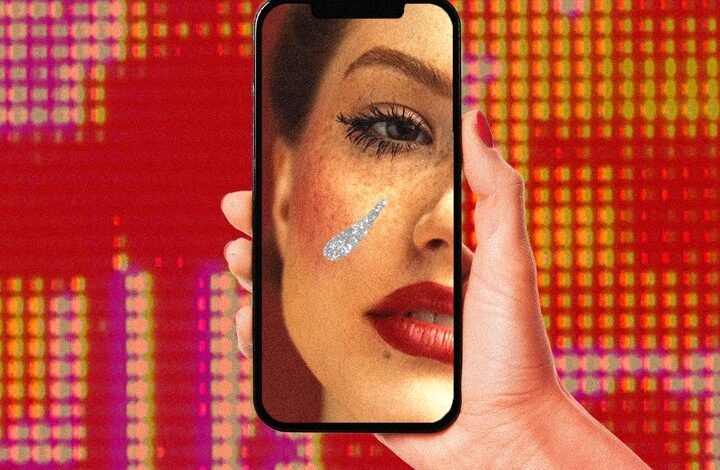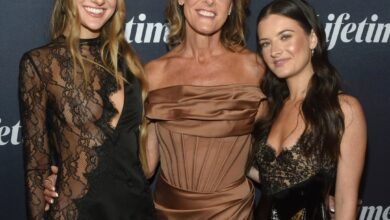How Do You Mourn an Influencer?

The last video that influencer Kyle Marisa Roth posted to her celebrity gossip TikTok account is only six seconds long, and it’s the classic type of content her more than 200,000 followers had come to expect from her. It’s pithy and funny, mentioning the pivotal pop culture moment that was JoJo Siwa and Tom Sandoval appearing on the reality show Special Forces together. The only thing it is missing is her catchphrase: “You want more? I’ll give you more!”
Now the video, which was posted April 7, and its comments section serve as a kind of public obituary. As one fan mournfully wrote, “I want more, and now you can’t give me more.”
Roth, a 36-year-old from Maryland, died earlier this month of an undisclosed cause, a fact that her fans first learned about when her mother announced it on LinkedIn last week. In an interview with NBC News, the family asked for privacy surrounding Roth’s death and what happened to her, saying they were still deciding how and what to share.
Truthfully, fans knew very little about Roth’s personal life or really any details about her besides her love of pop culture and gossip, especially blind items. But it’s clear that despite this lack of intimacy, Roth left an indelible mark on many. Tributes to her have flooded into the app, with people posting video after video praising her wit, her charm, and her style.
Roth’s death is just recent example of a phenomenon that is at once very old and very new: publicly mourning a public figure. In the past few months, several popular influencers have passed away, leaving hundreds of thousands of devoted followers grappling with how exactly to grieve someone they have never met yet felt a strong emotional attachment to.
There was Jessica Pettway, a beauty influencer known for her videos about hair and styling on YouTube, who died from cervical cancer in March. In one of her last posts, in August 2023, Pettway had written a heartbreaking tribute to her husband and children for their steadfast love and devotion through her illness. And even though Pettway had not posted often in the final months of her life, fans poured onto her account after her death was announced to pay tribute.
“So very sad to hear about your passing,” one wrote. “Theirs [sic] many influencers out there but whew, you really influenced. Rest in Heaven Queen.”
Just this week Eva Evans, a 29-year-old TikToker and web series creator, died in New York City, also of causes not immediately disclosed by her family (TMZ reported on Tuesday that Evans had died by suicide.) The tributes to Evans included Julia Fox, who stitched Evans’s last video on the app, posted a few days before her death, and posted a clip of herself visibly crying over the news. “NYC will never be the same without you,” she wrote.
Then there was the case of Danielle Johnson, known as the astrology influencer Danielle Ayoka, which rocked many who had followed her. On April 8, the day of the solar eclipse, officials say Johnson killed her partner in their home, then fled in her car with her two children. While she was driving, Johnson’s two kids—an 8-month-old and a 9-year-old—were “expelled” from the car, killing the baby and injuring the child. Johnson then crashed her car into a tree, killing herself. According to the Los Angeles Times, Johnson had posted erratic conspiracy theories about the cosmic event in the days leading up to the double murder and suicide.
Johnson’s crimes and death were another type of tragedy entirely, and the grief followers were left to grapple with was much more complex than those for the other influencers mentioned. Yet it still was grief, and many took to social media to express their feelings of bewilderment, horror, and shock. It even hit close to home in the Glamour offices; my colleague, Danielle Sinay, had DMed with Johnson in the past and says her death hit her harder than she would have expected.
“Honestly, when I saw what happened, I felt like I was going to throw up,” she tells me. “I hadn’t ‘spoken’ to her in years, but we had talked online over the years in a ‘Twitter friend’ kind of way…. I was shocked to see we actually still followed each other, and then I started getting really scared and paranoid, which isn’t rational, but it was what I felt because I was just so shocked.”
Like Sinay, others online said their emotions surrounding the loss of someone that they merely followed seemed to catch them off guard. But feeling a profound sense of loss and grief when a public figure dies isn’t an unusual experience, says Dara Greenwood, a social psychologist and associate professor at Vassar College who has done research into parasocial relationships like the ones many feel with online celebrities.
“On the one hand, we might feel like we are not ‘supposed’ to feel pain when someone we didn’t know personally dies. On the other hand, we also intuitively understand the experience of both personal and collective grief over the loss of public figures ranging from Martin Luther King Jr. to Princess Diana to Robin Williams,” she tells me.
Influencers, though, are an interesting type of public figure. They are not as “famous” as, say, Robin Williams, and yet much more intimately involved with their audiences. This can almost make them feel like more of a friend than anything else, especially if you follow them closely. Greenwood says she isn’t aware of any research that studies the phenomenon of influencer deaths specifically, but it’s possible these sorts of losses could hit harder than even a beloved celebrity.
“Because there can be more perceived or actual interactivity with influencers, the loss may feel closer to home. To the extent that an online celebrity deliberately cultivates seemingly intimate relationships with followers by sharing their stories, talents, and interests on a daily basis, they may feel more embedded into the emotional lives of their fans and their loss may be felt more acutely,” she says.
In fact, she likens what we are now seeing online as a type of funeral.
“Social media can also enable the sharing of positive memories and expressions of why a particular media figure felt meaningful in their lives,” she says. “Funerals can be powerful rituals to help us memorialize and accept the death of a loved one; social media can function as a kind of publicly accessible funeral, with many people offering their own short reflections and eulogies.”
It’s all part of a parasocial relationship, she says, and ultimately we are more connected to those we follow than we may think.
“Some people may be more overwhelmed or upset by media figures’ losses than others, depending on the nature of their parasocial engagement, which in turn might depend on their particular emotional vulnerabilities,” she says. “After all, how we respond to media figures tends to say more about us than the media figure themselves.”
Stephanie McNeal is a senior editor at Glamour and the author of Swipe Up for More! Inside the Unfiltered Lives of Influencers.




